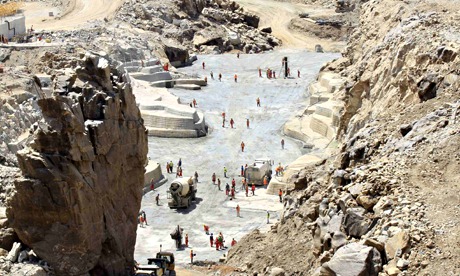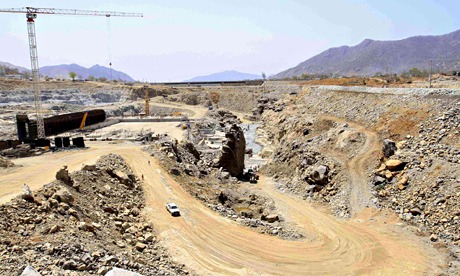Emeline Wuilbercq

Labourers work at the Grand Renaissance dam in Guba Woreda, Ethiopia. Photograph: Tiksa Negeri/Reuters
The 4x4 roars off, kicking up a cloud of dust. With one hand on the wheel, the other stifling a yawn, Semegnew Bekele could do this trip with his eyes shut. A construction engineer, he has driven down this track at every hour of the day or night over the past three years. "Ordinary people are building an extraordinary project," he says. He is referring to the Grand Ethiopian Renaissance dam (Gerd), in the north-west corner of the country close to the border with Sudan. Four hours away from the town of Assosa more than 8,500 workers and engineers are labouring on a massive project to harness the waters of the Blue Nile.
The site is closely guarded. Only officially authorised vehicles are allowed through the three checkpoints. As the kilometres flicker by, the din of the diggers becomes more audible. Then the gigantic site itself appears, with thousands of tonnes of aggregate piled up and smooth expanses of concrete lining the bottom of the Guba valley, ringed by arid hills. The hundreds of families belonging to the Gumuz indigenous people, who lived off fishing, have been moved to a location several tens of kilometres away, making room for a hydroelectric power station that will be the largest in Africa when it comes online in 2017. At present only a third of it has been built.
Bekele, who works for the Ethiopian Electric Power corporation, has already worked on two dam construction jobs, both on the river Omo in the south-west. He answers our questions with a flood of figures: the dam will be 1,780 metres long and 145 high, with a reservoir covering 1,874 sq km expected to contain 70bn cubic metres of water. Output from the 16 turbines will total 6,000MW. It will be sufficient to meet growing demand in Ethiopia, now Africa's second most populous country, where gross domestic product is estimated to have grown by 10.5% annually over the past five years.
The countdown has already started for Bekele: he has three years left to complete this concrete colossus. "I don't feel like a special person," he says, "just an engineer leading the project." True enough, the driving force behind the dam is former prime minister Meles Zenawi, who ran the country for more than two decades. He was obsessed with the country's rebirth. The structure will be built, whatever the cost, he asserted, upon laying the first stone in April 2011. He died the following year.
International bodies such as Amnesty International and Human Rights Watch were extremely critical of his record on human rights, but he knew how to rouse national fervour and mobilise the country for the five-year growth and transformation plan launched in 2010, which included Gerd.
 Due to open in 2017, the Grand Ethiopian Renaissance dam will be Africa's largest hydroelectric power station. Photograph: Tiksa Negeri/Reuters
Due to open in 2017, the Grand Ethiopian Renaissance dam will be Africa's largest hydroelectric power station. Photograph: Tiksa Negeri/Reuters
The scheme is expected to cost $4.1bn. As the country has not received any international funding, the government has appealed to the population to buy treasury bonds. For civil servants it is mandatory. Companies have urged their personnel to give up a month's wages to support Gerd. In a country where information is under strict control, it is hard to say whether they have much choice. "We agreed, we want to contribute to development," bank clerk Birhanu Libsework, 25, tells us in a cafe in Addis Ababa. "We're prepared to make sacrifices for better living standards and more energy," says Genet Getachew, an Amharic teacher. A single mother, she helps her daughter with her homework by candle light during the frequent outages in the capital. "The government mustn't try to do a thousand things at once, but this one is necessary," says Yeshi Negash (name changed at her request), a sociology graduate.
The government has already raised more than $350m, a third of which has been contributed by Ethiopians abroad.
Ethiopia hopes to become an African lion. "We have finished with the syndrome of dependence," says Zadig Abraha, deputy-head of Gerd coordination. "We want to recover our past glory," he adds.
Some neighbouring countries are less upbeat about the project. Citing two treaties, dating from 1929 and 1959, Egypt claims a historic right over the Nile. It fears that the dam will restrict the flow of water. The treaties, signed with the UK and Sudan, allocate two-thirds of the Nile's water resources to Egypt, with the right to veto any project affecting the world's longest river.
"These treaties are now obsolete. We are entitled to build the dam," says Alemayehu Tegenu, Ethiopia's minister of water, energy and irrigation. "For a long time we derived no benefit from our river."
Mohamed Ghoneim, the Egyptian representative to the African Union, disagrees. "It's impossible to undertake a project on this scale without environmental impact studies to assess the consequences for downstream countries," he counters, speculating on a range of potential disasters: salt may accumulate in the soil; land downstream could turn to desert or the flow be interrupted; the dam might even break. "The Nile is a vital resource for 80 million Egyptians," he adds.
In 2012, a year after work started, Addis Ababa tasked an international panel of experts (from Ethiopia, Egypt and Sudan among others) with a study of the project's human and economic impact. In May 2013 they reported that further studies were needed. The Ethiopians have refused, saying enough time has already been wasted. Egypt is demanding a second international panel. Negotiations between Ethiopia and Egypt are deadlocked.
Night falls on the site. In the temporary lodgings, several thousand workers are falling asleep, while the next shift are playing football, soon to resume work. In a few years the Guba valley will be flooded. "The whole area will become a tourist attraction," Bekele suggests hopefully. But what will happen to the Gumuz community, we inquire. The engineer tells us to turn off the recorder. "We're all making sacrifices for our country," he says. "It seems only natural."
No comments:
Post a Comment